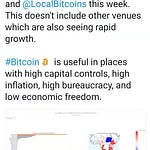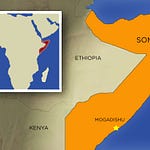Greetings Rare Ones🎉,
Welcome back to series 9 Education + Adoption: Blockchain in Africa. Are you new here? Welcome to the family of Rare Ones. This is the Rare Birds Emerging Market Podcast Newsletter. Each week I send out this long-form newsletter to our community of Rare Ones as I have unique conversations with early stage startup founders, ecosystem builders, and angel investors from across emerging markets. This long-form newsletter is a deep dive based on themes explored in the podcast conversation.
The Rare Birds Emerging Market Podcast Newsletter is written for Emerging Market early-stage startup founders, ecosystem builders, angel investors, and the curious. Rare Ones come here to gain fresh perspective and insights into what is happening on the ground in emerging markets from the people who are creating shifts and driving the action. It is where they can connect through stories that are distinctive, honest, and relatable. Join your fellow tribe of Rare Ones as we course correct and create new narratives together!
Get past podcast newsletters from the archives 👉🏾 here.
Additionally, I send out the Weekly News, an action-packed weekly curation of emerging market blockchain news and blockchain podcasts from across the web featured in the Rare Birds Magazine.
🔶 A Snippet 🔶
⛓ Blockchain News This Week:⛓
📑 Russian Crypto Industry Association Aims To Attract Miners
📑 Tianjin Released China’s First Blockchain-based Carbon Offset
⛓ Blockchain Podcasts This Week:⛓
📻Introducing DeFisset.com – A DeFi Asset Tracker by a Ghanaian-based Blockchain Developer
Get more from this week’s issue (#26)👉🏾 here.
Lastly, receive My Sunday Sevens🌱 a list of seven items I explored during the week.
🔶 Quick Recap 🔶
☛ Analysis from the Rare Birds Emerging Markets Podcast
☛ News from the Rare Birds Magazine
☛ Updates from My Sunday Sevens
As a teenager, Abdelfatah attended a high school that was known for driving political discourse in his country, Morocco. He grew up seeing his father collect local street boys to play football in his city of Casablanca, the economic hub of the country. His father never grew tired of doing good and led with an indomitable spirit of push hard today to achieve a different tomorrow. His mother’s roots are in Fez, the cultural capital, where she hails from a political family. Unsurprisingly, he believes in sound public governance as an enabler for change. He traveled to Cape Town for university 15 years ago and today he remains.
This week we enter the rabbit hole of decentralised governance and blockchain. We will do so with a series of essential BIG Questions, so together we can collectively understand: Decentralised Politics (DePo).
“Politics is pervasive. Everything is political and the choice to be “apolitical” is usually just an endorsement of the status quo and the unexamined life.” 1
🌱 Essential BIG Question: What is decentralisation in politics?
According to the World Bank, “Political decentralization aims to give citizens or their elected representatives more power in public decision-making.”2 To understand decentralisation we should also consider its complementary opposite: centralisation.
👇Have a Glance (i) 👇
Source: CFI
To decentralise is to transfer authority. Centralisation and decentralisation are ways in which governance is done. Within each mode of governance, there are varying degrees to which each is carried out.
In #180 The Blockchain Potential in Somalia: Education + Adoption-Blockchain in Africa (excerpt below) I alluded to the fact that [Blockchain and Cryptocurrency] as well as [digital currency and cryptocurrency] are often used interchangeably, to the chagrin of many. One of the key differences between these often conflated topics is centralisation and decentralisation.
Excerpt:“Blockchain (a distributed ledger technology-DLT) and cryptocurrency are often used interchangeably, however it should be understood that blockchain is the underlying technology which enables the creation of a cryptocurrency (the most popular being Bitcoin). The potential of the technology itself goes far beyond cryptocurrency and finance. It should be noted that we also see the terms digital currency and cryptocurrency used interchangeably, but they too, are very different (we will cover this in a separate newsletter).”
Digital currencies (digital money) are the umbrella term encompassing a variety of electronic money. Digital currencies are centralised, regulated, and not transparent. Cryptocurrencies are a subset of digital money, however, they are decentralised, unregulated, and transparent. They are secured by cryptography usually on a blockchain or some other DLT. That said there are some cryptocurrencies that are centralised and ran by their issuing organisations (I know that was confusing, we carry on!). Central Bank Digital Currencies (CBDCs) are regulated by Central Banks. They are a country’s money issued in digital form. They are managed on a DLT which may or may not be a blockchain. CBDCs are all the rage right now with many countries in the “race” to issue their own. To date, The Bahamas is the only country to launch its CBDC. A bevy of countries are in pilot mode including China, France, Singapore and others. The Eastern Caribbean Central Bank (ECCB) is the first currency union to launch a blockchain-based, digital version of the Eastern Caribbean dollar, known as D-Cash. It is currently active in only four of its member states.
Must View: CBDC Tracker
🌱Essential BIG Question: What are the properties and types of DLTs?
Properties
👇Have a Glance (ii) 👇
Source: Euromoney
Types
👇Have a Glance (iii) 👇
Source: Alastria Blockchain
In our conversation Abdelfatah mentioned that DePo will be built using a DLT but not necessarily using blockchain.
Having now developed an understanding of centralisation, decentralisation, digital currencies, and DLTs it is evident why there are such polarising views in this landscape, particularly where Bitcoin is concerned. I touched on this briefly in #181 The 4th Industrial Revolution & Blockchain Education + Adoption-Blockchain in Africa (excerpt below).
Excerpt: “🌱 Essential BIG Question: Why is Bitcoin so important in the blockchain discourse? Bitcoin for some is an asset class. Bitcoin for some is money. Bitcoin for some is a scam. Bitcoin for some is a philosophy and revolution. Irrespective of where one lies on the spectrum-maximalist or loather-there are individuals like Aurra who are benefitting from its existence.”
For Abdelfatah, however, there is a bigger issue beyond economics and finance and that’s politics.
”The problem now is not money, it is politics. Because politics is so dark and misunderstood, because the political class thinks it is money making rather than problem solving. The problem now is that finance is controlling politics. After understanding the technology, I began with why not politics?” Abdelfatah Mouttaqui
Abdelfatah believes that the African continent has a deficit which DePo ( Decentralised Politics) not too dissimilar to DeFi (Decentralised Finance) can fill. He says many African leaders are negligent, which has resulted in a despondent youth population. Rather than try to reform old political systems, he asserts this technology can create a new empowering system.
Suggested Reading: Decentralized parties: The future of on-chain governance
Excerpt: “A new breed of self-governing organizations is likely to take over in the upcoming decades, not only in business but also in the political sphere via decentralized parties….Political decentralization is the only way citizens can have a definitive say in the governance of their communities and lives. The desire for change in the political landscape is palpable and reflected in the growing voter absenteeism in many nations. Though decentralized parties will initially lack political influence, the craving for empowering technologies and purer forms of democracy will stimulate adoption over time.”
🌱 Essential BIG Question: What are the features and functions of DePo?
Abdelfatah shared the main feature of DePo as being transparency between party members and leaders via a DLT; which will support the following functions:
Secure e-voting
Public Administration (healthcare and education)
Tokenised Asset Trading
Smart contracts are currently being used to run systems. In the case of Abdelfatah, the system he proposes is a political party. Beyond parties, some believe that in the future, entire governments will run as DAOs.
Must Read: Ethereum Foundation: What is a DAO
Excerpt: “DAOs are an effective and safe way to work with like-minded folks around the globe. Think of them like an internet-native business that's collectively owned and managed by its members. They have built-in treasuries that no one has the authority to access without the approval of the group. Decisions are governed by proposals and voting to ensure everyone in the organisation has a voice. There's no CEO who can authorise spending based on their own whims and no chance of a dodgy CFO manipulating the books. Everything is out in the open and the rules around spending are baked into the DAO via its code.”
Some propose that governments are necessary for the management of the state. Unlike tech enthusiasts, they believe the merits and demerits of the technology are not substantial enough to support such claims.
Must Read: Blockchain Technology and Decentralised Governance: Is the state still necessary?
Excerpt: “Undoubtedly, the blockchain has remarkable properties as a distributed ledger, such as efficiency, cost-effectiveness, irreversibility, transparency, auditability, and censorship resistance. Yet, the proposal to decentralize government services through an open, unpermissioned blockchain entails a whole set of unknowns, which may overweight the benefits.”
In our conversation, we discussed DeFi as the tip of the iceberg for blockchain use cases. To hear more about how the technology is being used across the continent (beyond finance). I recommend listening in to my conversations with Chimezie Chuta and Dare Odumade, both based in Lagos, Nigeria. Chimezie currently heads up one of the largest blockchain advocacy networks in the country and Dare is using DLT to solve the problem of counterfeit drugs.
Must Listen:
“Companies in every industry need to assume that a software revolution is coming.”3
Thinking Point
When Marc Andreeson wrote his epic Wall Street Journal piece back in 2011 (Why Software is Eating the World) he stated that every company should assume a revolution is coming. I now wonder if at the time he envisioned this would also extend to governments? If you believe governments are essentially companies wrapped in cotton, then you foresaw the inevitable. If not, should we emphatically add that software will eat governments too?
Will blockchain technology save the world? It depends on whom you ask. For some, it is the missing link the world has needed to solve problems in business, economics, and politics. For others, it is mostly hype-driven by elitist technological utopians. There are also those somewhere in between who maintain that we should be selective of its uses and aware of its limitations.
Final Thoughts
A healthy tech ecosystem requires a multitude of opinions, views, and constant iterations to maintain critical debate. As the world and technology both evolve we need more thinkers and doers willing to “get dirty” by immersing themselves in both the theoretical and the practical. Technology will continue to eat away but it certainly won’t save the world. That unfortunately or fortunately, is the job of us mere mortals. Abdelfatah is forging ahead with a mammoth of a task. His aspirations are continental in size, but like his father, he will continue to chip away today with hopes of a better tomorrow.
Abdelfatah and I covered quite a bit in this conversation:
EPISODE HIGHLIGHTS
Get to Know Abdelfatah’s Childhood Influences
Relocating to South Africa and Calling Cape Town Home
Finding Out About Blockchain
Learning About Abdel’s Projects
Co-Authoring Blockchain in Islam
Introduction to DePo
The Need for DePo across the Continent
Properties of DePo
Challenges Faced on the Project
Technological Infrastructure to Support DePo
Gaining Support and Traction for DePo
What’s Next for DePo?
Lessons Learned
🔶 Visit Rare Birds TV for video podcasts with early stage founders from emerging markets. Our most recent episode features Trinidadian entrepreneurs Carla Williams-Johnson and Jamila Bannister. View Rare Birds TV here. 🔶
As always, thanks for reading and for exchanges, questions, critiques and collaborations message me via joann@rarebirdshq.com.
Bye for now and continue to stay Rare.
JoXx
Follow Rare Birds 👇
🔶 FaceBook 🔶 LinkedIn 🔶 Twitter 🔶 Instagram 🔶 YouTube🔶
Rebecca Solnit
The World Bank Group
Marc Andreessen
















Share this post